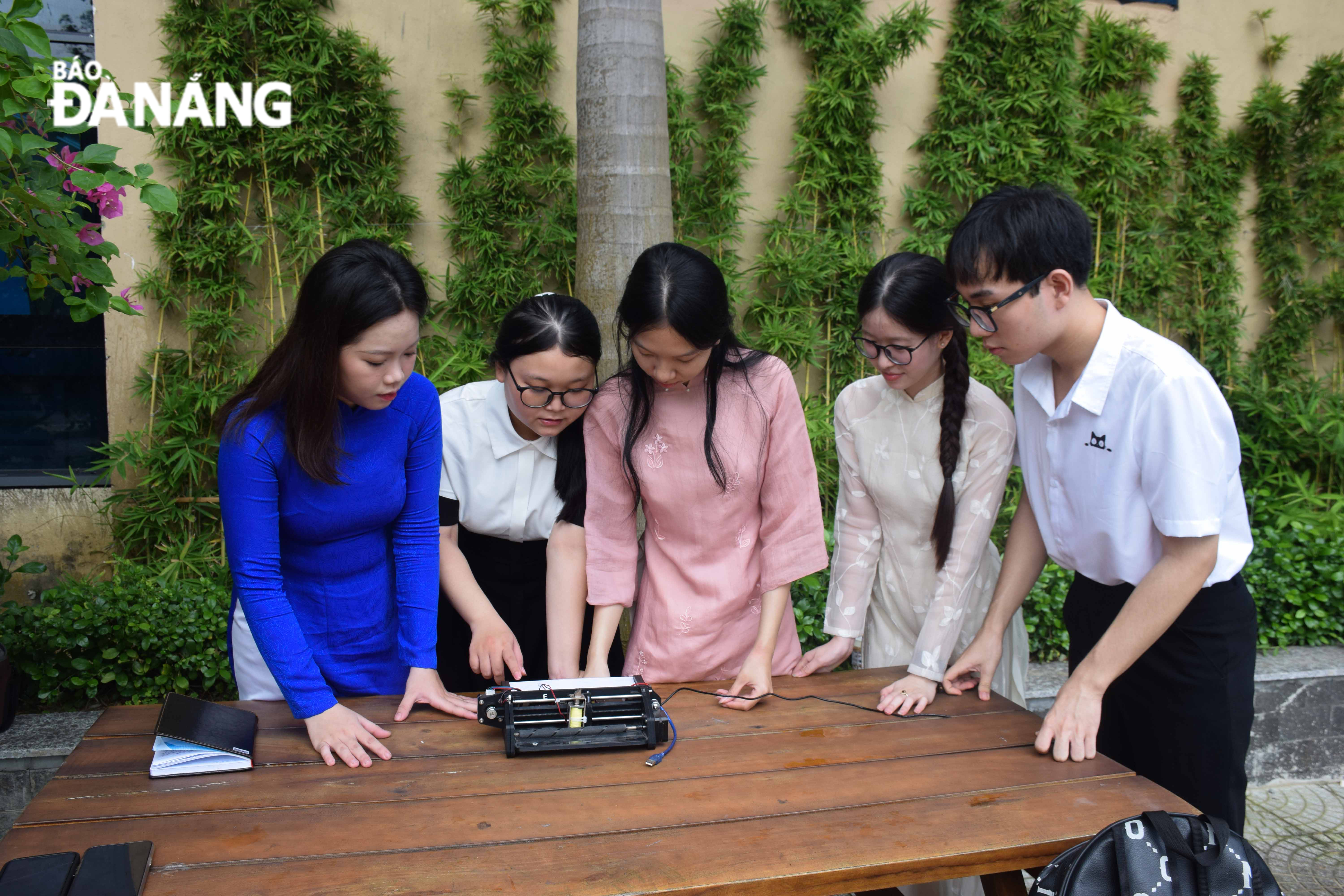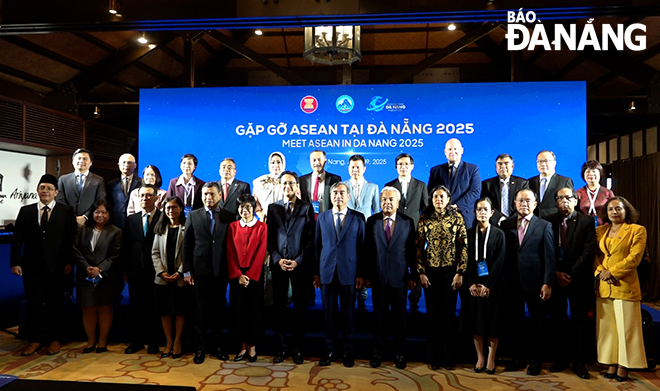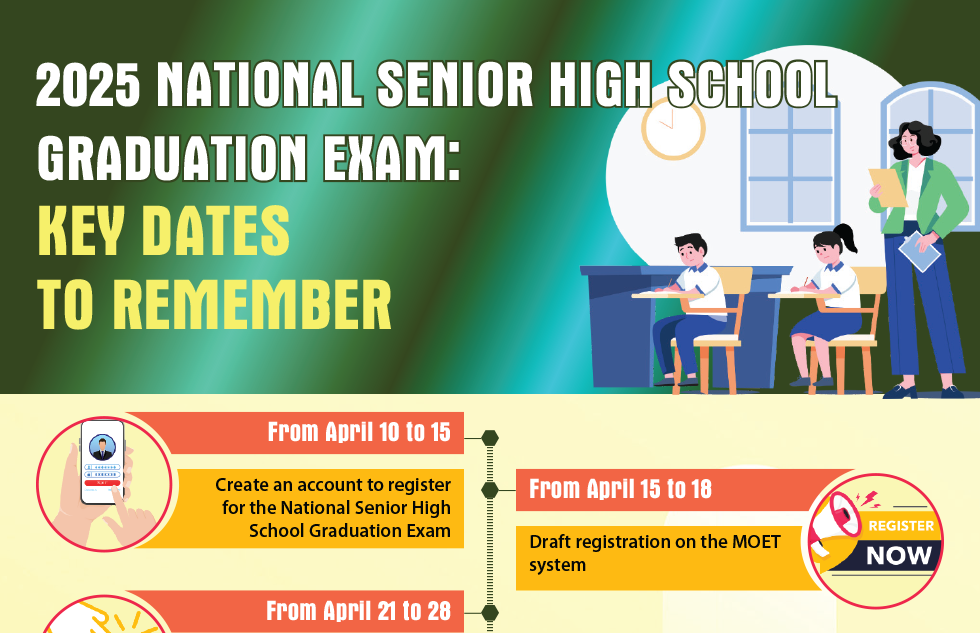Bringing scientific research into life
Scientific research not only helps students have the opportunity to approach their favourite professional field, but also creates a scientific working style and an objective view of problems. By applying the knowledge learned at school, students can participate in solving practical life problems with their own capacity and creative thinking.
 |
| Student Le Thanh Truc and her research team recheck the operation of the Braille printer after it was created. Photo: D.H.L |
Protecting the environment from traditional energy sources
With the specialised field of Automotive Engineering Technology, a group of students from the University of Technology and Education, a member of the University of Da Nang-UD, realised the potential of solid hydrogen storage technology in contributing to the building of a smart city, where effective energy management is extremely important.
The research team studied in depth the types of materials that can store hydrogen in solid form, especially metal alloys that can absorb and release hydrogen effectively.
Explaining the reason for choosing the topic ‘Solid hydrogen storage technology in smart cities’, student Vo Du Dinh, head of the research team, said that solid hydrogen storage technology plays an important role in protecting the urban environment by reducing polluting emissions from traditional energy sources.
Hydrogen is a clean energy source, when used, it does not create toxic emissions, thereby contributing to reducing air pollution.
Despite many difficulties, with a passion for scientific research and a shared goal of promoting the green transition in the current trend, Vo Du Dinh and the members of the team constantly strive to achieve the best possible research results.
Through the implementation of the topic, the team has expanded their knowledge, developed critical thinking skills when working in groups, developed research skills to find documents, improved design skills, logical thinking, and trained themselves to be highly disciplined.
The research results show that the solid hydrogen storage material using MgH2 compound tested has the ability to operate effectively with optimal performance in storing and releasing hydrogen. This technology not only ensures the basic level of safety and stability in the urban environment but also opens up many opportunities for application in energy management systems and green transportation.
The research team hopes that, with the cited achieved results, solid hydrogen storage technology will continue to be researched and developed further, becoming an important part in building smart and sustainable cities in the future.
Aiming at children with disabilities
While Vo Du Dinh’s research group is interested in protecting the urban environment, a group of students from the Faculty of Physics, the University of Education, a member of UD is aiming at humanistic values when creating a Braille printer used in converting textbooks and teaching materials for visually impaired students.
Sharing about choosing this topic, student Le Thanh Truc, head of the research team, said that the topic will be implemented from August 2023 to April 2024. When contacting the Centre for Supporting the Development of Inclusive Education in Da Nang, they learned that the center needed to print Braille but the machine was about to break down. If they bought a new one, it would cost VND300 million to VND500 million. From there, the group decided to carry out the topic to find a solution to support visually impaired students.
“Buying equipment abroad is very expensive, so the group had to make it by themselves to save the cost. For example, if there is no standard iron needle tip for Braille, the group made it by themselves. Or the drive system using a roller bar must be wrapped with sandpaper to be able to push the paper conveniently,” said Le Thanh Truc.
Student Dinh Thi Mai Chi, a member of the group, also said that in order to have the materials to make a Braille printer, the group had to spend a lot of time going to stores that specialize in selling electronics to ask the store owner to find a similar one, and then adjusted it for use at this centre. Initially, the printer also made noise and the group had to handle this shortcoming. The machine can convert digital Vietnamese text to readable Braille, making it easier for blind people to access information.
The research work took a lot of time and effort, but it gave the group the opportunity to be exposed to the technical and programming fields, which will help their later teaching process. In addition, the group also shared difficulties with visually impaired students and teachers at the Da Nang Centre for Supporting the Development of Inclusive Education.
Through the survey, the Braille printer received positive feedback such as convenience, ease of use, and pleasant sound during operation. The design of the printer is also assessed as easy to clean, convenient to repair and maintain when there is an error. Most teachers believe that this useful machine have the potential to be widely used in specialized schools.
Along with the above-mentioned two topics, many students from other universities in the city also have developed many research topics that were highly appreciated by experts and won many awards granted by the UD.
Reporting by DOAN HAO LUONG - Translating by A.THU








